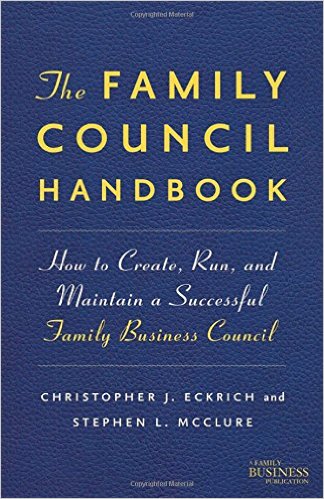Enterprising families and the businesses they own are complex. Managing the relationships among key stakeholders (family, owners, management, board) can produce feelings of uncertainty or anxiety for even the most seasoned family member. Yet new members to the enterprising family are often just thrown into the midst of all these complexities without adequate preparation. This can cause missteps and misunderstandings which may lead to hurt feelings, disillusionment and even hostility to the family enterprise and the family itself.
It doesn’t have to be this way, folks.
Welcome to the Business Family!
Clients often ask how they can be more purposeful in making new family members feel welcome not only within their families, but also at family meetings where business and family information is shared. In response, this article outlines approaches used by families who regularly meet to discuss their business interests, usually in the form of family meetings or family council meetings. (For a discussion on the difference, see The Family Council Handbook: How to Create, Run and Maintain a Successful Family Business Council.1)
Families who are more informal in their meeting processes may benefit from just trying one or two simple ideas from the suggested concepts. Families who are more formal in their meeting processes or have highly evolved and complex family and business governance processes would benefit from institutionalizing the processes over time. Because each family is different in how formal or informal their processes are and each new family member may be more or less exposed to enterprising families, a customized approach to welcoming and onboarding new family members is warranted.
These ideas are categorized into three separate groupings: welcoming behaviors, family meeting socialization and family business education.
Welcoming Behaviors
When a new spouse marries into a business-owning family, they often feel swallowed up by the gravitational pull of the enterprising family. One way to reduce this feeling is by having one-on-one discussions between family members and the new spouse. This allows for two-way exchange where each person can ask about the other person’s family. Business-owning families are often so focused on their own situations that they forget the simple nicety of engaging with new spouses to learn more about them and their families. By creating a safe dialogue where each person shows interest in the other and listens intently, the basis for trust is established. Asking about each other and the families they came from shows that you care about each other. These discussions also break down the feelings of intensity when trying to meet everyone at once.
When welcoming a new spouse, some families assign a family member to serve as a “family ambassador” to spend time getting to know the new member, perhaps sharing lunch together. This family ambassador will then join the new spouse when meeting the broader family, making introductions and sharing special things that have been learned about the new family member. The new spouse is not rushed into a setting with everyone in a formal family meeting, but instead is welcomed into the family.
The family ambassador can also serve a mentor by explaining important historical markers in the family and enterprise, sharing special traits about the enterprising family and discussing future opportunities for the new spouse’s participation in family meetings. Starting slowly is important with lots of time for questions. The new spouse should be told that this family member is playing an assigned role and can serve as a go-to person with questions or concerns. The family ambassador can also help the new spouse navigate the complex family and business dynamics present.
Socializing Newcomers to Established Family Meeting Processes
Once the new spouse has been welcomed, it is time to expose the new spouse to the family’s established meeting processes. This includes differentiating between types of meetings that are held, which could include:
- Family meetings where everyone in the family above a certain age is present to discuss family business matters verses,
- Family management meetings where only those employed in the business meet to stay aligned with each other and build effective working relationships and,
- Ownership meetings where owners gather to provide direction to the enterprise or,
- Foundation meetings where the family’s philanthropy is carried out.
Clarity should be made around which meetings the spouse may eventually participate in either as an observer or full participant. This information is often shared to the new spouse through continued efforts with the family ambassador, a family council member or family council committee.
Prior to inviting the new spouse to family meetings, great effort should be made to clearly lay out the family’s purposes for meeting — the “Why” we do this. This includes the values the family holds and how they impact the family and guide decisions in both family and business matters. The next step is to share the written mission and vision statements for the family and/or business along with the background of how they were created and are now being used. Lastly, explain the primary goals of each type of meeting, the meeting protocol (i.e. when is it okay to ask questions or give input) and expectations of the new spouse in the meeting. Leave plenty of time for questions during this pre-meeting stage.
The socialization process continues when the family ambassador accompanies the spouse to the first meeting, introducing family members, business employees, advisors and other new faces. Typically, the family ambassador sits next to the new spouse to quietly answer questions throughout the meeting about what is happening, why it is happening, or share background to matters being discussed without having to stop the meeting’s progress.
When the meeting is over, a debrief is recommended. Talking over what was observed, why certain things may have happened as they did, and allowing more questions set the stage for successful future meeting inclusion. For some new spouses, after attending one meeting with the family ambassador they are ready to integrate without further assistance. Other new spouses may want or need the socialization process to continue for some time, desiring to sit with the family ambassador in future meetings until they feel more integrated into the family and its meeting processes.
Family Education for Newcomers
While the socialization process provides some education about why the family does things the way it does and what is happening during meetings, newcomers may have other educational needs that can be delivered over time or through a more formal approach. As each family is unique, a process that fits with the family’s complexity and available resources should be thoughtfully designed with ample opportunities to learn.
Some families have the newcomer meet with individual family members to deliver the education. Others may have recordings or materials available for new spouses to learn on their own. Some families will structure a formal educational process to include a company visit, meetings with leaders in the business to learn about the company and what it does, and presentations by either non-family executives or family leaders.
Understanding how their new family works is always a challenging issue for any recent spouse. While every family is different, some topics should always be addressed:
- Overview of what the family is trying to accomplish together.
- Family history including reviewing a family tree to aid in the discussion about the history of the family. If the family has a timeline of key family events this can be incorporated. Frequently a senior family member will provide historical background and offer insights into what has been most important and lasting in the family.
- Assuming the family’s values, mission and vision were addressed during the socialization process, a review of these key elements is recommended to emphasize the importance of these guiding family documents.
The specific topics covered in education should be determined based on the new spouse’s exposure to the enterprise, general business knowledge, proficiency in reading business documents, etc. The following areas are typically covered when educating newcomers about the family business, but should be tailored for that person’s developmental needs:
Family Business Basics
- The role of family business in the nation with supporting statistics, if available.
- Common opportunities and challenges in being a family business.
- The nature of the family’s business:
- Share books, articles or videos that address the history of the business.
- Overview of entities identifying what they do and how each was begun and evolved to its current state.
- Governance structure utilized by the family business to assure proper oversight and continuity, including who sits on the board, how often it meets, types of topics covered in board meetings.
- How the family’s values and vision for the business impact the business culture and direction.
- The family’s philosophy and policies about family members serving as employees and board members.
- How to read and understand information presented in meetings such as financial statements, legal documents, business plans, etc.
Final Considerations
Welcoming, socializing and educating new spouses provides a strong basis for integration into the family. But when dealing with human beings, there are always exceptions to even the best processes. A new family member may not want to participate in formal family meetings and this should be respected. Forcing someone to participate will likely lead to resentment. Trust that the individual is making the best decision for her- or himself and that the passage of time may offer a greater openness to participation.
Families who are experiencing powerful emotional conflict are advised to move slowly in welcoming a new spouse to formal meeting processes. A new marriage takes adjustment and throwing a spouse into an emotional mine field is not likely to produce feelings of engagement or appreciation for the family. In these cases, new spouses are encouraged to consider working with a counselor to establish a professional support system and process feelings experienced, focusing on healthy coping mechanisms and responses.

1The Family Council Handbook: How to Create, Run and Maintain a Successful Family Business Council by Christopher Eckrich and Stephen McClure; A Family Business Publication published by Palgrave McMillan; 2012.

